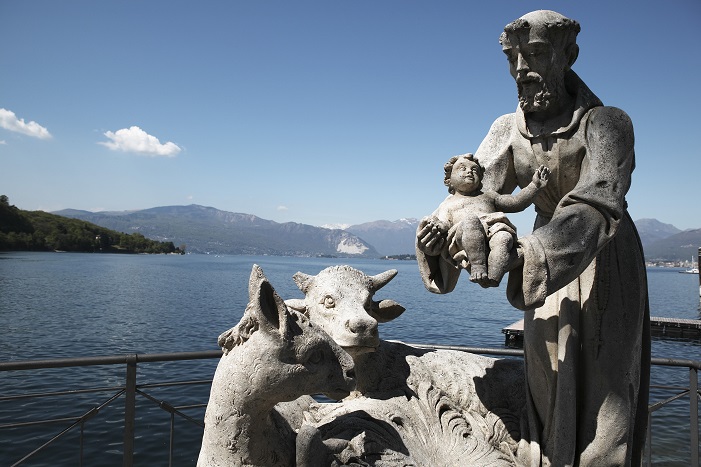
Aaron Koller is a professor of Near Eastern and Jewish studies at Yeshiva University and chair of the Department of Jewish Studies at Yeshiva College. He is the author of multiple books, including Unbinding Isaac: The Significance of the Akedah for Modern Jewish Thought (Jewish Publication Society, 2020). We caught up with him to talk about it.
ReformJudaism.org: In the Akeidah story, God commands Abraham to kill his son, whom he profoundly loves, and in whom all his hopes and dreams are vested as a test of faith – and in violation of God’s own promises to Abraham. How is such a divine command even conceivable?
Professor Aaron Koller: It would be inconceivable today, but in the time of Abraham, child sacrifice was actually practiced. In the Akeidah story (Genesis 22), God wants to know whether Abraham’s devotion is truly sincere with no ulterior motive, so he puts him to the ultimate test. Child sacrifice is qualitatively different from the sacrifice of a sheep, and only the sacrifice of a child can really show pure devotion to God.
But the story ends with the unbinding of Isaac. By calling it off, God sends a strong counter-message about child sacrifice. We need to see the Akeidah as a two-part story. In the first, God seemingly condones child sacrifice; in the second, God essentially forbids it.
What’s happening here is a conflict of principles. There is good, pious reason for child sacrifice, but there is an even more important reason for the prohibition of child sacrifice: In short, a child has independent value and sanctity as human being, and therefore, a father does not have the right to kill a child.
What is it about the story of the binding of Isaac makes it one of the most enduring, terrifying stories in the Bible?
The specter of infanticide is in of itself horrifying. Add to that the disconnect of this bare-bones 300-word narrative, which leaves us wanting more about the horrifying revelation, the tortured deliberation, the steely determination on the part of the characters. But none of this is reported in the Torah portion (Genesis 22) we read in the synagogue every year on Rosh HaShanah. Part of what makes the story so compelling is how sparingly it’s told.
Isaac is spared, but Abraham ends up paying a heavy price for obeying God’s command.
He did. After the Akeidah, Abraham never again speaks to Isaac, and he is not with Sarah at the time of her death, which some commentators say was caused by the shock of learning what Abraham was about to do to their son. Abraham may have passed the obedience-to-God test, but he paid a very heavy price as a father and husband.
You write that “the notion that sincere individual faith can license the suspension of all ethical considerations is a deeply dangerous idea.” How so, in the modern context?
A society cannot afford to allow an individual’s sense of religious devotion to take precedence over the welfare of others. An example of this is allowing parents to keep their children from being vaccinated against infectious diseases on religious grounds.
A secular society, made up of with people of many different religions, can't allow a person's particular religion to override what the state believes to be in the common good. This understanding prompted New York State last year to end religious-based exemptions for required vaccines.
I don't mean to oversimplify the issue. It's tricky for a modern state to decide when it should and should not trample on people's religious beliefs.
What prompted you to write Unbinding Isaac?
The idea came to me after watching a video of Mohammed Emwazi, a British member of ISIS, beheading a hostage in the desert. I imagined him arguing that he is usually a righteous and ethical person who was simply following the dictates of his faith: the beheading of infidels. If we accept the argument that faith can suspend ethics, then we don’t have an argument against that ISIS executioner.
More and more in the U.S., we hear demands for religious rights that seem to be in conflict with the idea of church/state separation. What do you see as the societal implications of this development?
This is tricky, because you can't prevent people from voting based on their faith. The U.S. Constitution holds that not only is the state not going to impose religion, it's also not going to impinge on religion.
I think the most important thing to realize is that Abraham was not – as some say – sacrificing himself. And this is why it was prevented: If you want to sacrifice yourself, that’s between you and your conscience, or you and God. But sacrifice someone else for your faith? No way. And that’s the public policy principle, too.
If someone wants to deny themselves medical treatment, it’s not for me to tell them they can’t, but they can’t put every other kid at risk. Faith is important, but the state can’t compromise on its own principles to accommodate religion. And my argument in the book is that the Torah is teaching that it wouldn’t ask you to do that.
What do you hope readers will take away from this book?
My aim is to turn the Akeidah from a distorting lens that leads some people to see “submissiveness” as the dominant element in religious thought to one in which the centrality of interpersonal ethics is plainly perceived.
Read past Torah commentaries addressing the Akeidah and sign up for Reform Voices of Torah, the Monday edition of our Ten Minutes of Torah email series, to receive weekly Torah commentaries via email.
Explore Jewish Life and Get Inspired
Subscribe for Emails

